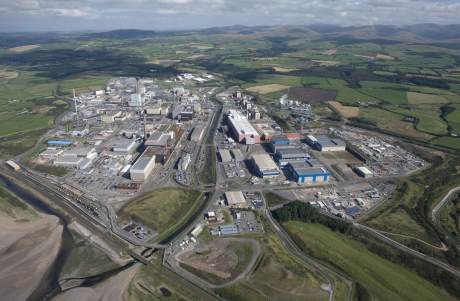The owner and operator of the UK's Sellafield complex, together with the country's nuclear regulator, have dismissed safety concerns raised in a BBC documentary investigating "the shocking state of Britain's most hazardous nuclear site".
 |
| The vast Sellafield nuclear complex (Image: Sellafield Ltd) |
"With a high-level whistleblower, hundreds of leaked documents and exclusive access to former senior managers, reporter Richard Bilton uncovers the truth about Sellafield," the BBC said in its promotion of the Panorama program, shown yesterday evening. "He finds an ageing and run-down plant, where nuclear waste is stored in dangerous conditions and insiders fear a serious accident."
In a joint statement, Sellafield Ltd and the Nuclear Decommissioning Authority (NDA) said, "It is disappointing that despite giving BBC Panorama access to Sellafield and spending a significant amount of time explaining complex issues, the program painted a negative picture of safety that we do not recognise."
The program claimed that areas of the Sellafield site regularly had insufficient staff on duty to meet minimum safety levels. However, Rex Strong, head of nuclear safety at Sellafield, said in the program, "You make alternative arrangements, so the things that have to be done get done. Facilities are shut down if we're not able to operate them in the way that we want to."
The Panorama program also claimed that liquid containing plutonium and uranium has been kept for years in thousands of plastic bottles only intended for temporary storage. In a statement, Sellafield Ltd said these samples are "kept securely" and that "to imply that such material is inappropriately managed is simply not true".
Sellafield Ltd and the NDA said, "Sellafield is safe, there is no question about that." They added. "Maintaining safety is the priority at Sellafield. Employees work around the clock every day to ensure that the site is safe today, tomorrow and in the future." Their statement noted, "Current safety performance is excellent and improving and the workers are making great progress in cleaning up Europe's most complex nuclear site on behalf of the UK taxpayer."
In a separate statement, the UK's Office for Nuclear Regulation (ONR) said, "A considerable amount of work is still required to clean up out of date facilities at Sellafield and decommission their older plants. But this does not mean they pose an immediate safety risk to workers or the public."
The ONR said it has seen "significant progress" at Sellafield in recent years. It added, "If we considered any plant to be unsafe we would shut it down or demand action to reduce that risk and return it to safety."
Tom Greatrex, chief executive of the Nuclear Industry Association, said, "The nuclear sector's number one priority is safety and security, of both its employees and the communities in which they are based. The UK has a unique decommissioning mission and rightly its priority, managed effectively by the NDA, is to deal with the highest hazards first. There has been real progress on reduction of hazard in the last three years, a point Richard Bilton completely ignored."
The Sellafield site is the largest nuclear site in Europe, and with over 1000 nuclear facilities on site ranks as one of the most complex in the world. Today the site is home to a wide range of operations including the decommissioning of redundant buildings associated with its early defence work dating back to the 1940s, used fuel management including reprocessing, and the safe management and storage of nuclear waste.
Researched and written
by World Nuclear News






_97013.jpg)
_51413.jpg)






